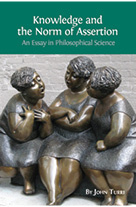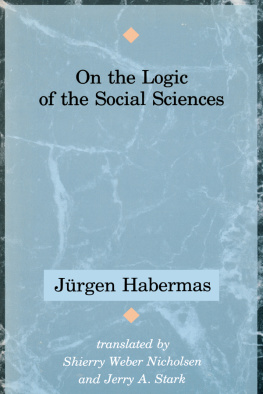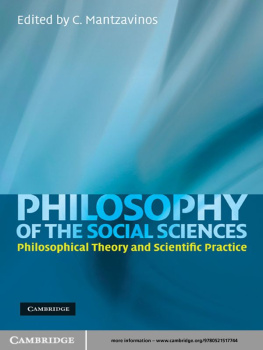ROUTLEDGE LIBRARY EDITIONS:
EVOLUTION
Volume 6
NATURE AND HISTORY
NATURE AND HISTORY
The Evolutionary Approach for Social Scientists
IGNAZIO MASULLI
First published in 1990 by Gordon & Breach Science Publishers
This edition first published in 2020
by Routledge
2 Park Square, Milton Park, Abingdon, Oxon OX14 4RN
and by Routledge
52 Vanderbilt Avenue, New York, NY 10017
Routledge is an imprint of the Taylor & Francis Group, an informa business
1990 OPA (Amsterdam) B.V.
All rights reserved. No part of this book may be reprinted or reproduced or utilised in any form or by any electronic, mechanical, or other means, now known or hereafter invented, including photocopying and recording, or in any information storage or retrieval system, without permission in writing from the publishers.
Trademark notice: Product or corporate names may be trademarks or registered trademarks, and are used only for identification and explanation without intent to infringe.
British Library Cataloguing in Publication Data
A catalogue record for this book is available from the British Library
ISBN: 978-0-367-27938-7 (Set)
ISBN: 978-0-429-31628-9 (Set) (ebk)
ISBN: 978-0-367-26036-1 (Volume 6) (hbk)
ISBN: 978-0-429-29136-4 (Volume 6) (ebk)
Publishers Note
The publisher has gone to great lengths to ensure the quality of this reprint but points out that some imperfections in the original copies may be apparent.
Disclaimer
The publisher has made every effort to trace copyright holders and would welcome correspondence from those they have been unable to trace.
NATURE AND HISTORY
The Evolutionary Approach for
Social Scientists
by
Ignazio Masulli
University of Bologna
Italy
Copyright 1990 by OPA (Amsterdam) B.V. All rights reserved. Published under license by Gordon and Breach Science Publishers S.A.
Gordon and Breach Science Publishers
Post Office Box 786
Cooper Station
New York, New York 10276
United States of America
5301 Tacony Street, Drawer 330
Philadelphia, Pennsylvania 19137
United States of America
Post Office Box 197
London WC2E 9PX
United Kingdom
58, rue Lhomond
75005 Paris
France
Post Office Box 161
1820 Montreux 2
Switzerland
3149, Okubo
Shinjuku-ku, Tokyo 169
Japan
Private Bag 8
Camberwell, Victoria 3124
Australia
Library of Congress Cataloging-in-Publication Data
Masulli, Ignazio.
Nature and history: the evolutionary approach for social scientists/by Ignazio Masulli.
p. cm. (The World futures general evolution studies: v. 1)
Includes bibliographical references.
ISBN 2-88124-376-2 (Switzerland)
1. Social historyMethodology. 2. Social sciencesMethodology. 3. ScienceMethodology. 4. System theory. I. Title. II. Series. HN28.M37 1990
300.72dc20
90-3082
CIP
No part of this book may be reproduced or utilized in any form or by any means, electronic or mechanical, including photocopying and recording, or by any information storage or retrieval system, without permission in writing from the publisher. Printed in the United States of America.
CONTENTS
This book originated from methodological reflections on the socio-historical sciences as compared with the natural sciences. This necessitated a long interdisciplinary research which led me to epistemological conclusions of a more general nature.
The chance to discuss the results of my research with Ervin Laszlo has been very important. I owe him a debt of gratitude for much more than his invaluable advice and encouragement. Meeting him has been one of the greatest privileges of my intellectual life.
I should also like to thank Timothy Keates for the patience and dedication with which he faced the numerous difficulties in translating my text.
The last few decades have witnessed some astonishing advances and achievements in science. This has brought about a situation where we can no longer view the evolution of nature and of man, his behavior, his form of organization, or his very thought, in the more traditional, more stock terms of our culture. Yet again science has forged ahead far beyond the conceptions we cling to, of ourselves, our lives; and this advance has come about not merely in the common way of such things, it pushes beyond many of the categories still predominant in the organization of scientific knowledge. The very grammar of this knowledge is changing before our eyes, demanding that we adopt new paradigms.
Several of the findings of contemporary science have contributed to new applications and substantiations of a basic question that has never been absent from the background and has often been touched upon or openly mooted. Today it can once again be raised in all its theoretical implications.
Can evolution, progressing by stages and degrees, from the simplest to the most complex forms, be subjected to a historical reading? So numerous and of such moment are the contributions of recent developments in the sciences, that even as regards the two points of evolution where the qualitative leap seemed at its most strikingthat of the origins of life and that of human thoughtwe may assert with Jacob that today physics dissolves in the study of the cell as biology dissolves in the study of man.
The findings and developments of molecular biology, genetics, embryology, population genetics, the biology of evolution and palaeontology, on the one hand, and the achievements of neurophysiology, the biology of knowledge, genetic psychology and the theory of cognition on the other, have led to an extensive reappraisal of the phenomena and conceptions regarding mans natural and cultural evolution. An important part has also been played in these achievements by the so-called transverse disciplines: cybernetics, systems theory, information theory.
The emergence of new perspectives and new scientific paths in seemingly more distant research fields, such as non-equilibrium thermodynamics, non-linear chemistry, and the dynamic systems theories in the area of theoretical mathematics, not to speak of the social sciences and cosmologyall have lent further scope and diversification to the overall picture.
On the basis of this scientific pluralism the problem has been posed as to how to establish an epistemology of complexity that shall be capable of accounting for those articulations that are destroyed by the separations between disciplines, between cognitive categories and types of knowledge.
The study of complex systems, independently of whatever specific field of investigation they belong to, now enables us to deal in more general terms with the problems of evolution. But we must be ready to abandon several of our more traditional perspectives and points of reference. Among these the relationship between biological evolution and mans cultural evolution is foremost in posing the greatest problems of conceptual revision.








